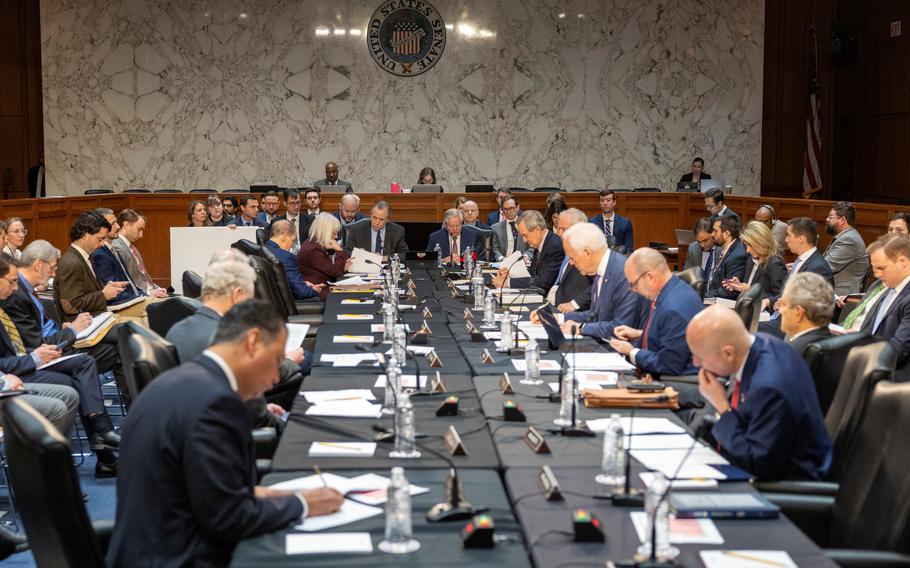
The Senate Budget Committee holds a meeting Wednesday, Feb. 12, 2025, in Washington to discuss government spending. (Eric Kayne/Stars and Stripes)
WASHINGTON — Republicans are moving closer to their goal of raising defense spending by at least $100 billion in the next decade as two budget resolutions paving the way for a massive bill that targets President Donald Trump’s domestic agenda advance in Congress.
The House Budget Committee on Thursday night signed off on the fiscal framework that will task the House Armed Services Committee with adding as much as $100 billion in military spending. Separately, the Senate Budget Committee on Wednesday night advanced its own version of the resolution, which calls for $150 billion in defense spending.
The House and Senate will need to eventually merge their budget blueprints into one version to move through a budget reconciliation process that will allow Republicans to bypass Democratic opposition and pass a spending package in the Senate with a simple majority rather than 60 votes.
Senate Republicans are moving forward with a resolution focused on strengthening defense, securing the U.S. border with Mexico and increasing energy independence while House Republicans are aiming to package those three priorities with an extension of Trump’s 2017 tax cuts. Senators intend to take up the tax cuts in a later bill.
Boosting the Pentagon’s $850 billion budget has long been a priority of the Republican chairmen of the House and Senate Armed Services committees, who argue the military needs generational investment in defense to counter China, Russia, Iran, North Korea and terrorism.
Rep. Jodey Arrington, R-Texas, the chairman of the House Budget Committee, said the fiscal framework approved Thursday will provide “critical resources” to Trump to “provide for the common defense” and deliver on his “America First” agenda.
Arrington said the resulting legislation will also fulfill Americans’ desire for troops who are “trained, not indoctrinated” and a military that is “ready to fight and win wars, not focused on the latest progressive cause celebre.”
Sen. Lindsey Graham, R-S.C., the chairman of the Senate Budget Committee, outlined several priorities for how the additional money on defense should be spent, including growing the Navy, bolstering air and missile defense and modernizing nuclear forces.
The House is scheduled to vote on its proposal by the end of February while the Senate could bring Graham’s budget resolution to the floor for a vote next week.

Sen. Lindsey Graham, R-S.C., listens to other senators on Wednesday, Feb. 12, 2025, during a Senate Budget Committee meeting in Washington. Sen. Jeff Merkley, D-Ore., is sitting to Graham’s right. (Eric Kayne/Stars and Stripes)
Democrats have resisted the Senate and House budget resolutions due to the cuts mandated within them. The House’s proposal asks the Energy and Commerce Committee, which handles Medicaid and other health care spending, to cut $880 billion during the decade and requires the Agriculture Committee, which oversees food stamps and farm supports, to find at least $230 billion in cuts.
Rep. Morgan McGarvey, D-Ky., said the spending reductions are “so draconian” that they will strip benefits millions of veterans and low-income junior enlisted service members rely on.
Medicaid covers 10% of veterans under the age of 65 and is the only health care coverage for 40% of those veterans, according to an analysis by the health policy nonprofit Kaiser Family Foundation. More than 2 million children and military-connected families also count on Medicaid for their health needs, McGarvey said.
About 1.2 million veterans also live in households that participate in the SNAP food assistance program, formerly known as food stamps, according to an analysis of U.S. Census Bureau data by the progressive think tank Center on Budget and Policy Priorities.
“Let me clear: a cut to SNAP or Medicaid is a cut to our veterans, people to whom we made a promise — a sacred promise to take care of them in exchange for them willing to put on a uniform and risk everything to take care of us,” McGarvey said. “Who is this bill for? It’s not for the veterans, it’s for Elon Musk and his friends.”
Republicans have denied that they will be kicking people off Medicaid. Rep. Buddy Carter, R-Ga., said they will instead “be making sure we secure, strengthen, stabilize Medicaid by eliminating waste, fraud and abuse.”
House Republicans also touted their planned trillions of dollars’ worth of tax cuts as a boon for veterans and small business owners. The House budget framework proposes tax cuts that will increase the deficit by up to $4.5 trillion in the next decade.